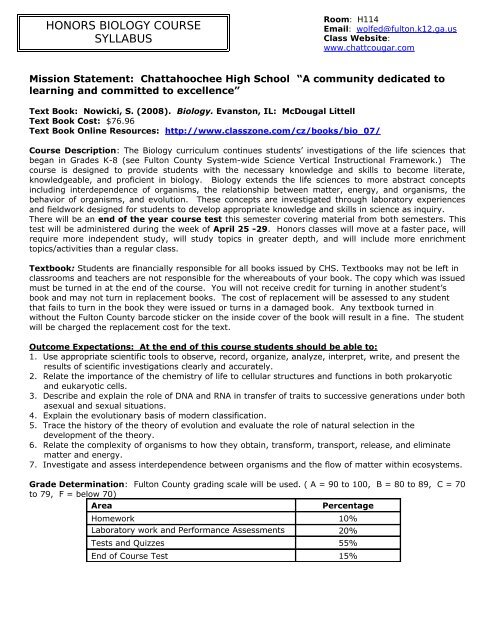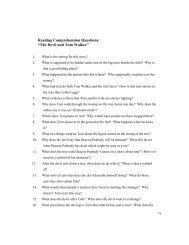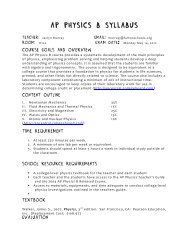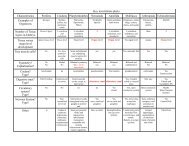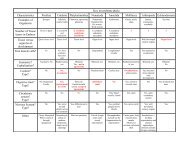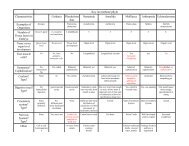Syllabus spring 10-11 honors bio.pdf - Chattahoochee High School
Syllabus spring 10-11 honors bio.pdf - Chattahoochee High School
Syllabus spring 10-11 honors bio.pdf - Chattahoochee High School
You also want an ePaper? Increase the reach of your titles
YUMPU automatically turns print PDFs into web optimized ePapers that Google loves.
HONORS BIOLOGY COURSE<br />
SYLLABUS<br />
Mr. Wolfe<br />
Mission Statement: <strong>Chattahoochee</strong> <strong>High</strong> <strong>School</strong> “A community dedicated to<br />
learning and committed to excellence”<br />
Text Book: Nowicki, S. (2008). Biology. Evanston, IL: McDougal Littell<br />
Text Book Cost: $76.96<br />
Text Book Online Resources: http://www.classzone.com/cz/books/<strong>bio</strong>_07/<br />
Course Description: The Biology curriculum continues students’ investigations of the life sciences that<br />
began in Grades K-8 (see Fulton County System-wide Science Vertical Instructional Framework.) The<br />
course is designed to provide students with the necessary knowledge and skills to become literate,<br />
knowledgeable, and proficient in <strong>bio</strong>logy. Biology extends the life sciences to more abstract concepts<br />
including interdependence of organisms, the relationship between matter, energy, and organisms, the<br />
behavior of organisms, and evolution. These concepts are investigated through laboratory experiences<br />
and fieldwork designed for students to develop appropriate knowledge and skills in science as inquiry.<br />
There will be an end of the year course test this semester covering material from both semesters. This<br />
test will be administered during the week of April 25 -29. Honors classes will move at a faster pace, will<br />
require more independent study, will study topics in greater depth, and will include more enrichment<br />
topics/activities than a regular class.<br />
Textbook: Students are financially responsible for all books issued by CHS. Textbooks may not be left in<br />
classrooms and teachers are not responsible for the whereabouts of your book. The copy which was issued<br />
must be turned in at the end of the course. You will not receive credit for turning in another student’s<br />
book and may not turn in replacement books. The cost of replacement will be assessed to any student<br />
that fails to turn in the book they were issued or turns in a damaged book. Any textbook turned in<br />
without the Fulton County barcode sticker on the inside cover of the book will result in a fine. The student<br />
will be charged the replacement cost for the text.<br />
Outcome Expectations: At the end of this course students should be able to:<br />
1. Use appropriate scientific tools to observe, record, organize, analyze, interpret, write, and present the<br />
results of scientific investigations clearly and accurately.<br />
2. Relate the importance of the chemistry of life to cellular structures and functions in both prokaryotic<br />
and eukaryotic cells.<br />
3. Describe and explain the role of DNA and RNA in transfer of traits to successive generations under both<br />
asexual and sexual situations.<br />
4. Explain the evolutionary basis of modern classification.<br />
5. Trace the history of the theory of evolution and evaluate the role of natural selection in the<br />
development of the theory.<br />
6. Relate the complexity of organisms to how they obtain, transform, transport, release, and eliminate<br />
matter and energy.<br />
7. Investigate and assess interdependence between organisms and the flow of matter within ecosystems.<br />
Grade Determination: Fulton County grading scale will be used. ( A = 90 to <strong>10</strong>0, B = 80 to 89, C = 70<br />
to 79, F = below 70)<br />
Area Percentage<br />
Homework <strong>10</strong>%<br />
Laboratory work and Performance Assessments 20%<br />
Tests and Quizzes 55%<br />
End of Course Test 15%<br />
Room: H<strong>11</strong>4<br />
Email: wolfed@fulton.k12.ga.us<br />
Class Website:<br />
www.chattcougar.com
The following objectives are critical science process skills not associated with any particular unit.<br />
They represent objectives that are regularly addressed and applied throughout the year.<br />
• GPS - SCSh1: Importance of curiosity, honesty, openness, and skepticism in science.<br />
• GPS - SCSh2: Use standard safety practices in all scientific investigations<br />
• GPS - SCSh3: Identify and investigate problems scientifically<br />
• GPS - SCSh4: Use tools and instruments for observing and measuring in scientific investigations<br />
• GPS - SCSh5: Demonstrate the computation and estimation skills necessary for analyzing data<br />
and developing reasonable explanations<br />
•<br />
•<br />
GPS - SCSh6: Communicate scientific investigations and information clearly<br />
GPS Standards: The Georgia Performance Standards for <strong>bio</strong>logy can be found at the State of Georgia’s<br />
Performance Standards website (http://www.georgiastandards.org/science.aspx) or you may contact the<br />
teacher for a hard-copy of the standards.<br />
Unit Chapter(s) Duration Georgia Performance Standards<br />
GPS – SB2: Students will analyze how <strong>bio</strong>logical traits<br />
are passed on to successive generations.<br />
a. Distinguish between DNA and RNA.<br />
b. Explain the role of DNA in storing and transmitting<br />
cellular information.<br />
c. Using Mendel’s laws, explain the role of meiosis in<br />
reproductive variability.<br />
d. Describe the relationships between changes in DNA and<br />
potential appearance of new traits including<br />
• Alterations during replication.<br />
Genetics 7, 8, 9 5 weeks • Insertions<br />
• Deletions<br />
• Substitutions<br />
• Mutagenic factors that can alter DNA.<br />
• <strong>High</strong> energy radiation (x-rays and ultraviolet)<br />
• Chemical<br />
e. Compare the advantages of sexual reproduction and<br />
asexual reproduction in different situations.<br />
f. Examine the use of DNA technology in forensics,<br />
medicine, and agriculture.<br />
Evolution <strong>10</strong>, <strong>11</strong>, 12 5 weeks<br />
Diversity &<br />
Classification<br />
17, 18, 19<br />
(portions of<br />
chapters<br />
20-27)<br />
5 weeks<br />
GPS – SB5: Students will evaluate the role of natural<br />
selection in the development of the theory of evolution.<br />
a. Trace the history of the theory.<br />
b. Explain the history of life in terms of <strong>bio</strong>diversity, ancestry,<br />
and the rates of evolution.<br />
c. Explain how fossil and <strong>bio</strong>chemical evidence support the<br />
theory.<br />
d. Relate natural selection to changes in organisms.<br />
e. Recognize the role of evolution to <strong>bio</strong>logical resistance<br />
(pesticide and anti<strong>bio</strong>tic resistance).<br />
GPS – SB3: Students will derive the relationship<br />
between single-celled and multi-celled organisms and<br />
the increasing complexity of systems.<br />
a. Explain the cycling of energy through the processes of<br />
photosynthesis and respiration.<br />
b. Compare how structures and function vary between the<br />
six kingdoms (archaebacteria, eubacteria, protists,<br />
fungi, plants, and animals).<br />
c. Examine the evolutionary basis of modern classification<br />
systems.<br />
d. Compare and contrast viruses with living organisms.
Biology Extensions<br />
and Enrichment<br />
Supplementa<br />
l material &<br />
portions of<br />
chapters 20-<br />
27<br />
2 weeks<br />
(This is not an official GPS unit and will be covered after the<br />
EOCT if time permits)<br />
**NOTE: Due to content requirements and student achievement, this course outline is<br />
subject to change to best<br />
address the needs of individual classes.<br />
Tests and Quizzes: A written test is given at the completion of each unit. Tests include information<br />
from class notes, the textbook, lab activities, worksheets, and demonstrations that were completed during<br />
a unit. Quizzes carry half the weight of a test, and are given approximately twice per semester. Test<br />
make-ups will be according to Fulton County Policy.<br />
Make-ups are to be scheduled individually with the instructor.<br />
Homework: Homework will be given on a daily basis. Often, homework will consist of reading selected<br />
sections from the textbook. You can check www.chattcougar.com for homework assignments.<br />
Laboratory Activities: Lab activities will be performed approximately once a week. You will be<br />
responsible for performing the lab in class and completing the necessary lab report. A lab assessment will<br />
be given based on the labs done in class. Labs must be MADE UP PROMPTLY. See me for scheduling a lab<br />
make-up time.<br />
Extra Help: There will be review sessions on test mornings, starting at 7:50. There will be no extra<br />
credit projects, and your lowest test grade will NOT be dropped, so be prepared, and complete all<br />
assignments on time.<br />
Honor Code Violation: The honor code policy is strictly enforced. Any act of cheating, “either by giving<br />
or receiving information on a gradable experience”, will be considered a violation. An honor code violation<br />
“may be used by the faculty in making future recommendations, specifically, membership in honor clubs<br />
(NHS and Beta Club).” I will inform your parents of the violation and you will receive a grade of zero.<br />
Please refer to your handbook for more specifics.<br />
Technology Code of Ethics: According to the Fulton County <strong>School</strong>s policy, “students shall not alter or<br />
attempt to alter school or private property including technology hardware and software.” This includes:<br />
a. changing desktop settings or control panels<br />
b. removing or damaging mouse tracking balls, keys, cables, connectors, network jacks, or any other<br />
hardware<br />
c. modifying computer software<br />
d. damaging computer discs, CD-ROMS, or other media<br />
Recovery Policy: Recovery is an opportunity for a student to demonstrate competence and mastery of<br />
objectives. In order to be eligible for recovery, a student must have completed all assigned work and<br />
demonstrated a genuine effort, including attendance. Students are responsible for contacting the teacher<br />
concerning recovery opportunities. Teachers will establish, at their discretion and the concurrence of the<br />
department head, a reasonable time period for recovery work to be completed during the semester. All<br />
recovery work must be completed prior to the last <strong>10</strong> school days of the semester. There will be only one<br />
recovery opportunity per failed major assignment or test.<br />
CHATTAHOOCHEE HIGH SCHOOL RECOVERY GUIDELINES:<br />
Recovery is available to students with a cumulative grade below 74% after a minimum of two (2) major<br />
grades. The maximum grade a student can earn for a recovery activity is 70%. There will be only one<br />
recovery opportunity per failed major assignment or test. The individual teacher will determine the means<br />
of recovery. THE STUDENT MUST INITIATE THE PROCESS WITHIN FIVE (5) DAYS OF NOTIFICATION OF A<br />
FAILING GRADE ON A MAJOR ASSIGNMENT/TEST.


